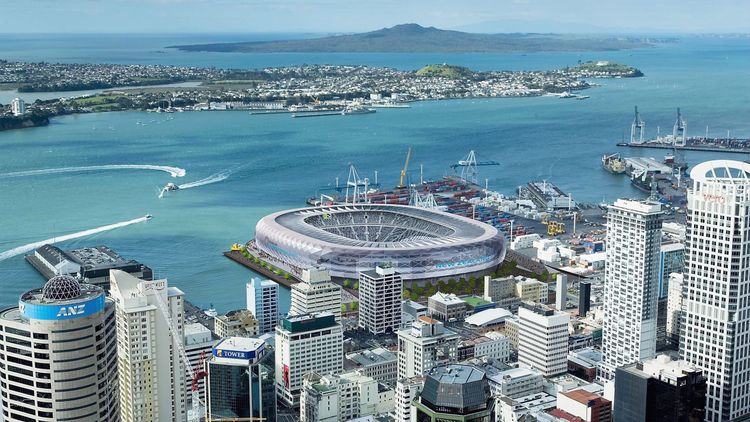The stadiums that could have been contenders

Opinion: A waterfront stadium is the poltergeist (‘noisy ghost’) of Auckland politics.
In material form, it doesn’t exist, but you cannot escape its presence. Life goes on as normal for a while, then the kitchen window appears to have opened and the floorboards are creaking in the next room. It’s back, haunting the living.
The latest sighting of the waterfront stadium was last week, when Bill Foley, the billionaire franchise owner of Auckland’s new A-League football club, announced that a 20,000-seat waterfront stadium was part of the club’s plan. Though based at Mount Smart initially, “we want our own stadium”, he said .
The idea of a waterfront stadium has been a feature of public debate in Auckland for many years.
In 2006, Trevor Mallard, the minister responsible for the 2011 Rugby World Cup, declared that building a stadium on Auckland’s waterfront was preferable to upgrading Eden Park for the event.
In 2016, newly elected Mayor Phil Goff, also reticent to spend the money required to upgrade Eden Park, floated the idea of a stadium on the rail yard next to what was then Vector Arena.
‘The promotion of unsolicited proposals via the media is surely part of a strategy to lead public debate, mould public opinion and put pressure on elected representatives to act‘
In 2017, he commissioned PricewaterhouseCoopers to investigate options for a centrally located stadium, but was accused, in 2018, of ‘hoarding’ the report, only allowing councillors to view it under supervision in the mayoral office. He denied the accusation.
The $1 million feasibility report noted such stadia typically do not generate enough revenue to cover operational costs and upkeep, and that they usually require “a large component of upfront and/or ongoing funding […] from the public sector”.
Then, in 2018, unbidden by any government request for ideas, a stadium duel broke out.
In May, architects Archimedia proposed a redevelopment plan for Auckland’s eastern waterfront. Its design images depicted green spaces and large lagoons, with a new stadium as its centrepiece. By October, a group called the Auckland Waterfront Consortium threw down its gauntlet, proposing its own redevelopment plan, including a stadium dubbed ‘the Crater’, lowered 28m into the seabed.
These are what practitioners and researchers of urban development call ‘unsolicited proposals’. In Australia, many such proposals from the private sector are put to government through legislatively enabled channels that bypass public scrutiny. No such arrangement exists in New Zealand. Going by critiques of the Australian experience, we can be thankful for that.
Unsolicited proposals for waterfront stadia in Auckland have happened ‘in plain sight’, but as my co-authored paper to be published in Urban Policy and Research shows, these very public efforts may be just as influential on decision-makers.
Both the Archimedia and Auckland Waterfront Consortium proposals received extensive media coverage, much of it effusive, giving megaphones to their private-sector backers to further promote to the public and elected representatives the apparent benefits of their proposals.
One Auckland Waterfront Consortium member went as far to say a waterfront stadium could be Auckland’s Instagram-worthy Sydney Opera House ‘moment’.
These were early skirmishes in the ‘stadium war’, as the New Zealand Herald dubbed it.
In April this year, the Eden Park Trust put forward its plan for Eden Park 2.0. The Auckland Waterfront Consortium quickly revamped its 2018 proposal, presumably wary of the Eden Park plan attracting central and local government’s attention and funding.
The promotion of unsolicited proposals via the media is surely part of a strategy to lead public debate, mould public opinion and put pressure on elected representatives to act.
Even if elected representatives avoid endorsing one of the particular proposals being promoted, with enough encouragement through the media, they might be inclined to accept as inevitable the general notion of a waterfront stadium.
And it appears to be heading this way. In September, noting that council and central government had “received several unsolicited proposals” in recent years, Auckland Council put out a call for expressions of interest for an ‘Auckland Main Stadium’.
Council is now contemplating eight expressions of interest, reportedly more than it expected, and with its 10-year budget due in mid-2024, there is added impetus for it to resolve the issue of the waterfront stadium.
It’s not yet possible to know which proposal, if any, is destined to win the stadium battle. Indeed, it will prove impossible to square Council’s desire for a stadium “at no or little cost to ratepayers” with its own commissioned research that foresaw large amounts of upfront or ongoing funding (or both) from the public sector as being necessary – including subsidisation through advantageous rates rebates, leasing arrangements, special development permission or outright transfer of public land.
Yet, the fact that Auckland Council is giving serious consideration to redeveloping the waterfront around a new stadium is significant. The repetitive hauntings of previous unsolicited proposals may have done enough to win the stadium war.
With Auckland Council having flushed out various parties interested in developing an Auckland Main Stadium, now seems like a good time for elected representatives to engage the public in a transparent discussion about the waterfront’s future.









































